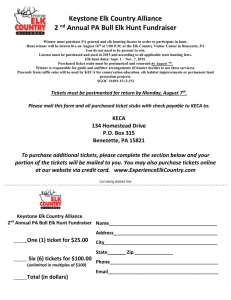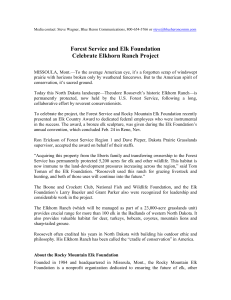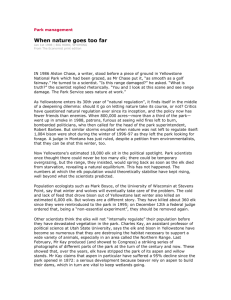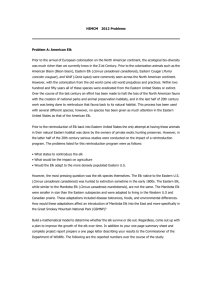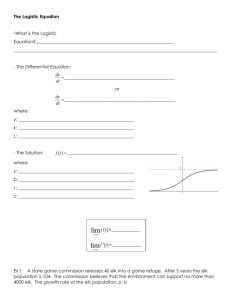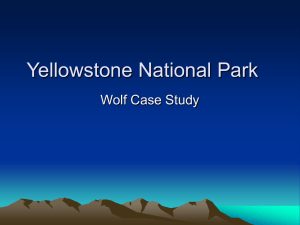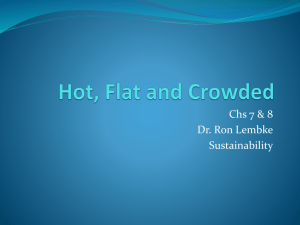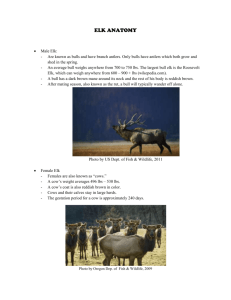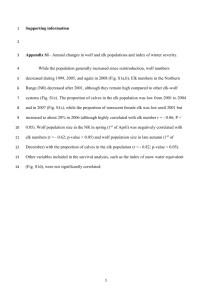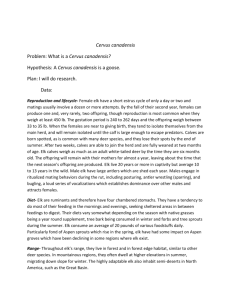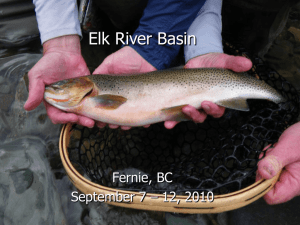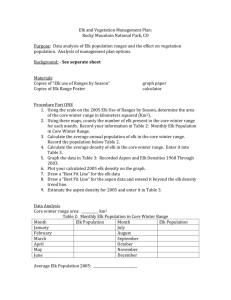Black Elk Chapter Overview 4+ - Amstud 2010
advertisement
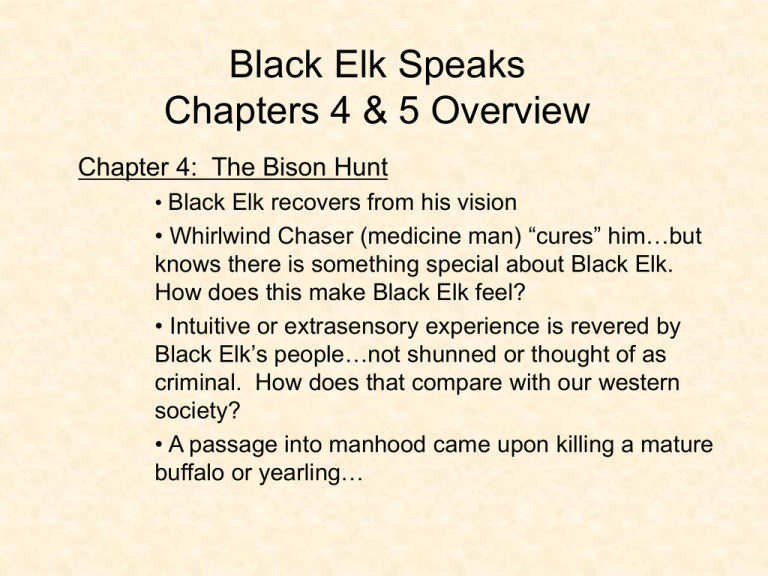
Black Elk Speaks Chapters 4 & 5 Overview Chapter 4: The Bison Hunt • Black Elk recovers from his vision • Whirlwind Chaser (medicine man) “cures” him…but knows there is something special about Black Elk. How does this make Black Elk feel? • Intuitive or extrasensory experience is revered by Black Elk’s people…not shunned or thought of as criminal. How does that compare with our western society? • A passage into manhood came upon killing a mature buffalo or yearling… The Bison Hunt…con’t. • The Crier (scout) plays a significant role in the lives of the Sioux…they did not keep livestock for food. • The hunt and its rewards is cause for great celebration. Would you eat raw buffalo liver? • Symbolism of butchering at the site of the hunt…and the ensuing celebration and role of the advisors. How do the advisors display their generosity? • Black Elk’s inability to shoot a bird while out hunting. How does that tie to his vision? • The Native Americans are happy as long as they can pursue their traditional life and patterns…and practice their heritage of cultural significance. The Bison Hunt: Ch. 4 Key Element of Black Elk thus far: • The Native Americans are happy as long as they can pursue their traditional life and patterns…and practice their heritage of cultural significance. Chapter 5: Soldier’s Town • After the hunt, the Lakota bands disperse… • Black Elk joins his relatives near Fort Robinson; Crazy Horse refuses to associate with the Wasichu. Why would there be this division? • Black Elk goes deer hunting with his father, and falls back into the realm of his vision – Caused by the sound of the spotted eagle – Tells his father that the deer will come to them • Black Elk is becoming more accustomed to his vision…growing more comfortable with it. – Thunder makes him feel happy – “queer” feeling when he hears the sound of the eagle. • The time at the fort is one of the last happy times Black Elk’s people have…What is the significance of this? Chapter 6: Wasichu In The Hills • Very much a turning point in Black Elk’s story • Black Elk is now 11 years old…1874 • Significance of the flock of sparrows and squirrel hunt…The Vision and Grandfathers’ prophecy • The threat of Pahuska…Long Hair…General Custer. Why does Custer wear his hair so long? • 1875, Col. Dodge arrives with 400 men and 75 wagons on a geological expedition • 1868 Treaty and the Black Hills territory. • The meeting with the “Grandfather at Washington” and leasing the Black Hills to mine for gold. Consent or we’ll take the land anyway. What is the impact of this? • Black Elk meets his relative Crazy Horse…first chief to come from Black Elk’s family. • The U.S. Cavalry ultimately raids Crazy Horse’s village…killing men, women and children. • This chapter further marks the tension between the whites and Native Americans • Began making treaties with the Sioux in 1851; in 1871, Congress stopped recognizing the N.A. tribes as sovereign nations. • The economic greed of GOLD…and notable efforts to civilize the Native Americans…led to the establishment of agencies to manage/control the tribal populations. • Square houses (p. 8 Drinks Water’s vision) were built for the Native Americans… • Taking away the power and significance of the round teepee • Confined the heretofore nomadic peoples • What would be the mental and physical impact of this? • Some cooperated (e.g. Red Cloud) while others resisted. • Courage v. self-preservation? • Note: significance/symbolism of the dead Indian…foreshadowing numerous deaths to come Chapter 10: Walking the Black Road • Wherever we went, the soldiers came to kill us, and it was all our own country. It was already when the Wasichus made the treaty with Red Cloud, that said it would be ours as long as the grass should grow and the water flow. That was only eight winters before, and they were chasing us now because we remembered, and they forgot (p. 102) – What does this say about the integrity of Treaties? • How could men get fat by being bad, and starve by being good? (pp. 105-106) Chapter 16: Heyoka Ceremony • You have noticed that the truth comes into this world with two faces. One is sad with suffering, and the other laughs; but it is the same face, laughing or weeping.(p145) » What is significant about this quote? Chapter 17: The First Cure • It is a bad way to live, for there is no power in a square…birds make their nests in circles, for theirs is the same religion as ours. (p.150) • But the Wasichus have put us in these square boxes. Our power is gone, and we are dying, for the power is not in us any more. (p.151) Chapter 19: Across the Big Water • The Wasichus did not kill them (buffalo) to eat; they killed them for the metal that makes them crazy, and they took only the hides to sell. Sometimes they did not even take the hides, only the tongues… (p.164 » Ah, the delicacy of the bison tongue…from roughly 30,000,000 to 300 in 1894! • There have been many lies, but we could not eat them (p.165) » How do you think this ultimately impacted Black Elk and his people? • …but I was like a man who had never had a vision. I felt dead, and my people seemed lost and I thought I might never find them again…they had forgotten that the earth was their mother. (p.167) » Why do you think Black Elk was so “down” on himself? Chapter 24: The Butchering at Wounded Knee • Dead and wounded women and children and little babies were all scattered along where they had been trying to run away. The soldiers had followed along the gulch, as they ran, and murdered them in there…at it was one long grave of butchered women and children and babies, who had never done any harm and were only trying to run away. (pp.199-201) • A people’s dream died there. It was a beautiful dream. And I, to whom a great vision was given in my youth, you see me now a pitiful old man who has done nothing, for the nation’s hoop is broken and scattered. There is no center any longer, and the sacred tree is dead. (p.207) » What is the irony in Black Elk’s closing words?
